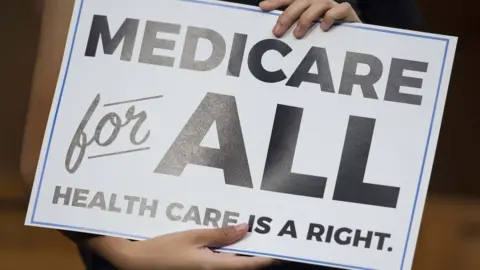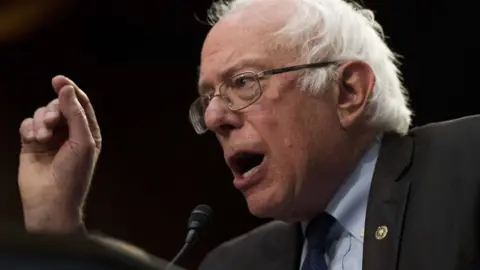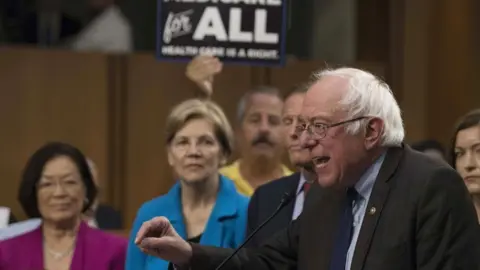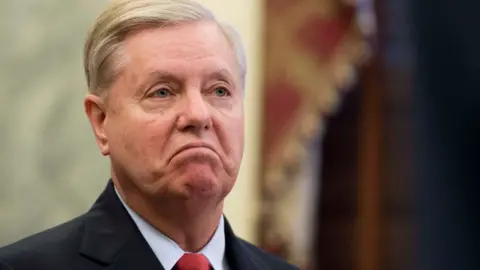Bernie Sanders pitches European-style healthcare system
 Getty Images
Getty ImagesLess than two months after successfully stymying Republican attempts to roll back Barack Obama's healthcare reforms, Democrats are going on the attack.
On Wednesday afternoon Vermont Senator Bernie Sanders followed through on a promise to introduce a universal healthcare programme that replaces the current regulated free-market insurance system with a government-run one.
Titled the Medicare for All Act of 2017, the senator's bill would expand the popular Medicare insurance programme, currently available to those age 65 or older, to all Americans over the course of four years.
Private insurance would still be available, but it would be supplemental. Basic medical needs, including doctor's appointments, medical procedures and prescription drugs, would be provided at no out-of-pocket costs, paid for by tax dollars (at an estimated cost of $32tn over 10 years).
The plan would, in short, turn the US system of health insurance - which currently largely relies on employers providing subsidised health insurance to their workers - on its head. And this is just fine for Mr Sanders.
 Getty Images
Getty Images"Under Medicare for All the average American family will be much better off financially than under the current system because you will no longer be writing checks to private insurance companies," he said in his press event marking the introduction of his bill.
Mr Sanders points to healthcare systems nations like Australia, Canada, Denmark and France as examples of more efficient government-managed programmes than the current US model. Canada, for instance, spends $4,533 (£3,433) per capita on healthcare, compared to the $10,000 (£7,575) by the US
The Sanders plan also has a less-than-zero chance of becoming law in this Republican-controlled Congress. Its immediate political prospects, however, aren't why Wednesday's move is significant.
Democratic support is growing
This isn't the first time Mr Sanders has proposed a universal health insurance system, but it's the first time he's made serious headway within Democratic Party ranks.
"Single-payer insurance", as it's often called because healthcare providers are reimbursed by a single government entity, was considered a bridge too far for the party back in 2009. That was when, with sizable majorities in Congress and the White House for the first time in eight years, Democrats set about in earnest to realise their decades-long goal of healthcare reform.
Instead they enacted Obamacare, a proposal with conservative roots that boosted insurance subsidised for the poor, increased regulation to ensure minimum standards in healthcare coverage, set up a government-managed private insurance marketplace for those not covered by employer plans and mandated that all Americans had to have some form of insurance or pay a penalty.
The party was fiercely attacked for passing the bill without Republican support - and they were routed in the congressional midterm elections the following year. Since then they've been largely fighting a rear-guard action, defending Obamacare against Republican efforts to roll back the reforms through repeal legislation in Congress and legal challenges in the courts.
Last year Hillary Clinton ground through an extended Democratic presidential primary battle with Mr Sanders, who was campaigning on a slightly different single-payer proposal. The former secretary of state dismissed the idea of a more ambitious healthcare programme as unrealistic given the current political climate.
 Getty Images
Getty ImagesWith her defeat in November, conventional wisdom was that the future of healthcare lay with less government control, as conservatives gave more power to states to devise their own systems or let the free market have its way.
It didn't quite work out that way, as Republican efforts to repeal Obamacare crashed and burned amid intra-party disagreement over how to change the system. Now, a Democratic Party - buoyed by an active and engaged progressive base- is largely ready to reach for the brass ring of government-run health insurance.
In the House of Representatives, 115 out of the 187 Democrats have signed up to co-sponsor similar Medicare-expansion legislation. In the Senate, 15 out of 48 are with Mr Sanders on his bill.
What's more, the legislation is attracting interest from politicians seen as likely contenders for the party's 2020 presidential nomination.
The support of Massachusetts Senator Elizabeth Warren, a firebrand liberal, is not surprising. Garnering the backing of moderates like New Jersey Senator Cory Booker, Kamala Harris of California and New York's Kirsten Gillibrand, however, is a bigger tell.
It's becoming clear - if it wasn't already - that the upcoming Democratic presidential nomination contest, which will begin in earnest in 2019, will be conducted on progressive soil. The danger for candidates is seeming too moderate or too timid, and support for single-payer is a relatively easy way to burnish their liberal bona fides.
Mrs Clinton's centre-left pragmatism may be in danger of sinking along with her presidential aspirations.
Rebranding as "Medicare for all" is smart
According to a Quinnipiac poll in early August, Americans support a single-payer healthcare system that expands Medicare by a 51 to 38 percent margin.
In a July Kaiser Foundation survey, 64% of respondents viewed "Medicare for all" favourably, while only 44% gave a thumbs up to a "single-payer health insurance system". When the details were explained, that margin narrowed - but the reality is that Medicare is a popular programme familiar to most Americans, and tying it to any new government healthcare reform appears to help boost its support.
As New York magazine's Ed Kilgore notes, however, simply "expanding" Medicare - which is a bit of a confusing hodgepodge of programmes itself - could be harder than it seems.
"Maybe it's time for single-payer advocates to place less emphasis on alleged simplicity, and more on health care as a right that Americans should enjoy universally and equally," he writes. "It might avoid some hard feelings down the road."
For the moment, however, it's an effective label for supporters to use.
"We are going to wrap ourselves in the flag of Medicare," Adam Green, co-founder of the Progressive Change Campaign Committee told the New Republic's Graham Vyse. "We're going to dare Republicans to oppose expanding Medicare to millions of Americans."
Some Democrats are nervous - and Republicans are licking their chops
Kilgore isn't alone in his reservations about Mr Sanders' latest efforts.
Only one senator from a state that was in play during last year's presidential election, Tammy Baldwin of Wisconsin, has backed the Sanders bill so far. West Virginia's Joe Manchin, one of the most at-risk Democrats up for re-election in 2018, has expressed interest but remains uncommitted.
Back in July Senate Republicans advanced a plan, crafted as an amendment to their healthcare reform attempts, to set up a single-payer system. The proposal received no votes in favour, with four Democrats voting against and the rest abstaining rather than go along with what they say as a conservative ploy to cause divisions within their party.
Just two months later, it's Mr Sanders and fellow progressive Democrats who are forcing the issue - and Democrats are still uneasy.
 Getty Images
Getty ImagesSome warn that while the Democrat Party may be moving to the left on healthcare, the rest of the nation isn't with them. Their proposal, which would include massive government spending - estimates are as high as $32tn over 10 years - and taxes to support it, would be a non-starter for many Americans, particularly as conservatives began pushing horror stories of "European-style socialism" with medical rationing and lower-quality care.
While supporters will point out that any taxes would be offset by ending the need to pay private insurance premiums, the average American voter may not make that connection.
In a press conference unveiling the latest Republican healthcare proposal earlier on Wednesday, South Carolina Senator Lindsey Graham labelled the Medicare-for-all legislation "Berniecare" and said it would lower healthcare quality and lead to an unsustainable budget.
Others are concerned that this is a fight Democrats don't need to have. The party successfully defended Obamacare - at least for now - and they should focus on consolidating and improving that programme, rather than starting from scratch.
This is exactly what Mrs Clinton said to Mr Sanders during the Democratic primary debates last year, of course.
"Democrats are committing themselves to years more of treacherous health care debate, at a time when there are more pressing issues to confront," writes Bill Scher in Politico. "They are emulating Donald Trump's penchant for quick-fix, bumper-sticker solutions that prove to be, in his own words, more 'complicated' once in power.'
But if it means Democrats sweep to power on the back of the issue, that may be a problem they're more than willing to face.
Follow Anthony Zurcher on Twitter.
